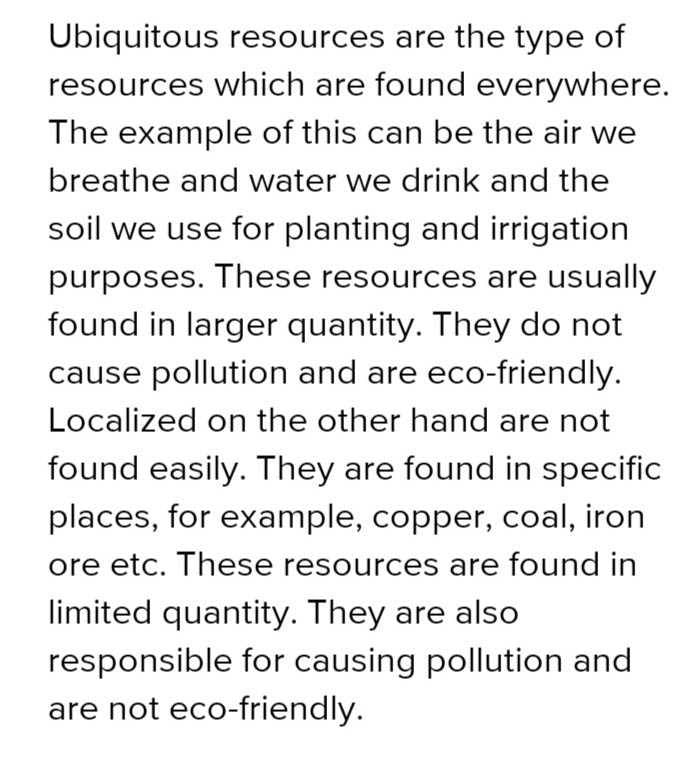Class 8 Exam > Class 8 Questions > Differentiate between ubiquitous and localise...
Start Learning for Free
Differentiate between ubiquitous and localised resources?
Most Upvoted Answer
Differentiate between ubiquitous and localised resources?
Differentiation between Ubiquitous and Localised Resources:
Ubiquitous resources are those that are found all over the world, while localised resources are found only in specific locations. The following are some of the differences between ubiquitous and localised resources:
1. Definition:
Ubiquitous resources are resources that are found all over the world, while localised resources are resources that are found only in specific locations.
2. Examples:
Ubiquitous resources include air, water, and sunlight, while localised resources include minerals, petroleum, and natural gas.
3. Distribution:
Ubiquitous resources are distributed evenly across the world, while localised resources are found in specific locations.
4. Accessibility:
Ubiquitous resources are generally more accessible than localised resources, which are often difficult to access due to their location or the cost of extraction.
5. Economic Impact:
Localised resources can have a significant economic impact on the regions where they are found, while ubiquitous resources do not usually have as much of an economic impact.
In conclusion, while ubiquitous resources are found all over the world and are more accessible, localised resources are found only in specific locations and can have a significant economic impact on those regions.
Ubiquitous resources are those that are found all over the world, while localised resources are found only in specific locations. The following are some of the differences between ubiquitous and localised resources:
1. Definition:
Ubiquitous resources are resources that are found all over the world, while localised resources are resources that are found only in specific locations.
2. Examples:
Ubiquitous resources include air, water, and sunlight, while localised resources include minerals, petroleum, and natural gas.
3. Distribution:
Ubiquitous resources are distributed evenly across the world, while localised resources are found in specific locations.
4. Accessibility:
Ubiquitous resources are generally more accessible than localised resources, which are often difficult to access due to their location or the cost of extraction.
5. Economic Impact:
Localised resources can have a significant economic impact on the regions where they are found, while ubiquitous resources do not usually have as much of an economic impact.
In conclusion, while ubiquitous resources are found all over the world and are more accessible, localised resources are found only in specific locations and can have a significant economic impact on those regions.
Community Answer
Differentiate between ubiquitous and localised resources?

Attention Class 8 Students!
To make sure you are not studying endlessly, EduRev has designed Class 8 study material, with Structured Courses, Videos, & Test Series. Plus get personalized analysis, doubt solving and improvement plans to achieve a great score in Class 8.

|
Explore Courses for Class 8 exam
|

|
Similar Class 8 Doubts
Differentiate between ubiquitous and localised resources?
Question Description
Differentiate between ubiquitous and localised resources? for Class 8 2024 is part of Class 8 preparation. The Question and answers have been prepared according to the Class 8 exam syllabus. Information about Differentiate between ubiquitous and localised resources? covers all topics & solutions for Class 8 2024 Exam. Find important definitions, questions, meanings, examples, exercises and tests below for Differentiate between ubiquitous and localised resources?.
Differentiate between ubiquitous and localised resources? for Class 8 2024 is part of Class 8 preparation. The Question and answers have been prepared according to the Class 8 exam syllabus. Information about Differentiate between ubiquitous and localised resources? covers all topics & solutions for Class 8 2024 Exam. Find important definitions, questions, meanings, examples, exercises and tests below for Differentiate between ubiquitous and localised resources?.
Solutions for Differentiate between ubiquitous and localised resources? in English & in Hindi are available as part of our courses for Class 8.
Download more important topics, notes, lectures and mock test series for Class 8 Exam by signing up for free.
Here you can find the meaning of Differentiate between ubiquitous and localised resources? defined & explained in the simplest way possible. Besides giving the explanation of
Differentiate between ubiquitous and localised resources?, a detailed solution for Differentiate between ubiquitous and localised resources? has been provided alongside types of Differentiate between ubiquitous and localised resources? theory, EduRev gives you an
ample number of questions to practice Differentiate between ubiquitous and localised resources? tests, examples and also practice Class 8 tests.

|
Explore Courses for Class 8 exam
|

|
Suggested Free Tests
Signup for Free!
Signup to see your scores go up within 7 days! Learn & Practice with 1000+ FREE Notes, Videos & Tests.

























